

Why is Custom Healthcare Software Development Important?






The healthcare industry is under immense pressure to deliver better patient outcomes, reduce operational costs, and accelerate digital transformation. As demands for efficiency, data accuracy, and personalized care rise, traditional off-the-shelf software often falls short of meeting the unique needs of healthcare providers.
Custom healthcare software development bridges this gap by offering tailored solutions that align with specific workflows, compliance requirements, and patient engagement goals.
From electronic health records (EHRs) and telemedicine platforms to AI-powered diagnostics and hospital management systems, custom solutions enable healthcare organizations to integrate processes, enhance data security, and make smarter clinical decisions.
Moreover, they help overcome interoperability challenges by connecting disparate systems and ensuring real-time data flow across departments. In an era where healthcare must balance quality, affordability, and speed, custom software development is not just an advantage; it’s a necessity for delivering high-value, patient-centered care efficiently and sustainably.
This blog offers insights into the importance of custom healthcare software, key drivers, types, features, benefits, and much more.
In a healthcare landscape where providers face mounting pressure to improve outcomes, cut costs, and accelerate digital transformation, custom software development plays a pivotal role in enabling agile, patient-centric and cost-effective care.
The global healthcare software-as-a-service (SaaS) market is projected at USD 30.04 billion in 2025, growing at a ~20% CAGR through 2030.
These numbers spotlight the large and rapidly expanding demand for healthcare-specific software solutions, underscoring why tailored development is increasingly critical for providers and vendors alike.
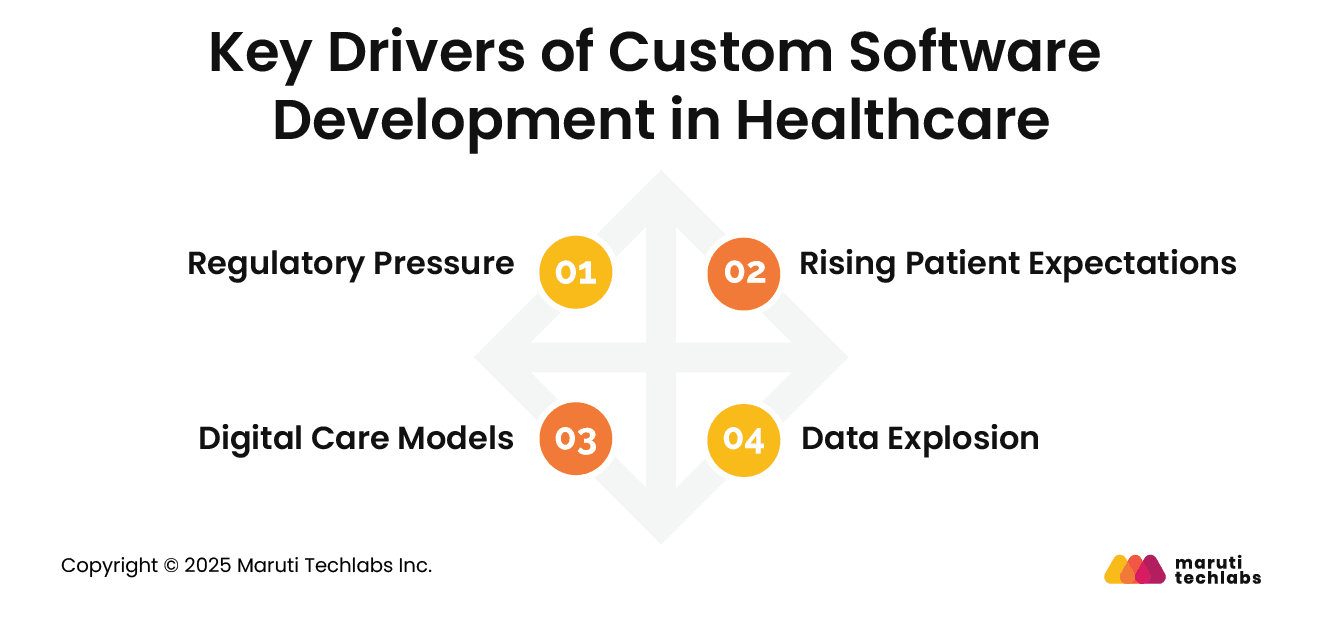
Healthcare providers are under intense regulatory scrutiny from data privacy mandates to value-based care models. Custom software helps ensure compliance with standards (such as HIPAA, GDPR) and supports reporting, audit trails and governance more precisely than generic solutions.
Today’s patients expect personalized, seamless, digital care journeys, online access to records, tele-visits, mobile engagement and fast responses. Custom software enables providers to meet these expectations by shaping unique workflows and experiences rather than adapting to one-size-fits-all systems.
The shift to telemedicine, remote monitoring, home-based care and hybrid service delivery is accelerating. Off-the-shelf software often lacks the flexibility to support these new models, making custom development vital for adapting systems, integrating devices and enabling new care pathways.
Healthcare is generating massive volumes of data from EHRs, wearables, IoT devices, genomics and analytics. Custom software solutions are needed to ingest, process, integrate and extract insights from this growing data pool, turning raw data into actionable care intelligence.
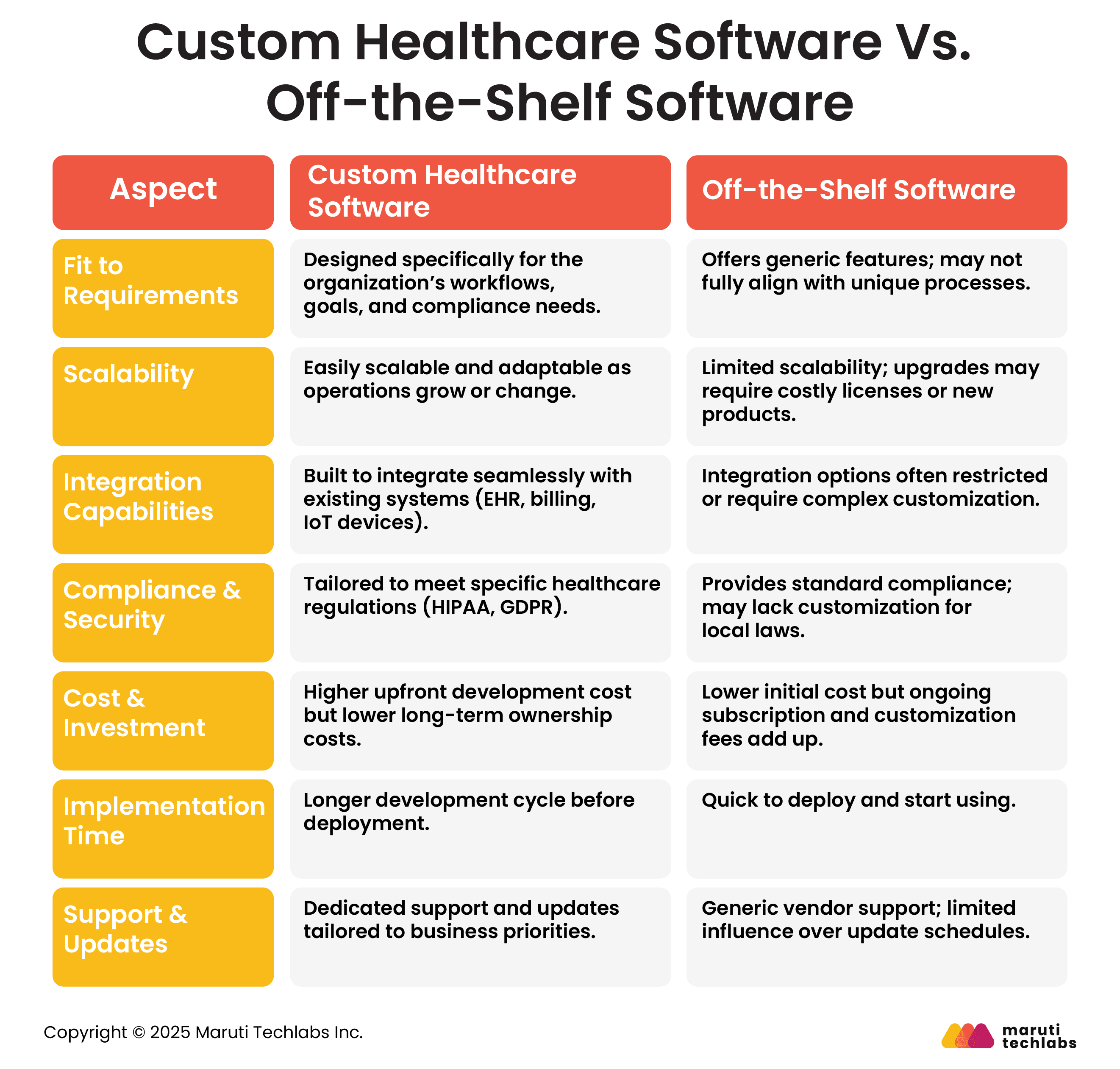
The right technological tools are crucial for delivering, managing, and improving services. While generic software solutions provide a basic foundation, they often fail to meet different healthcare institutions' unique and complex needs.
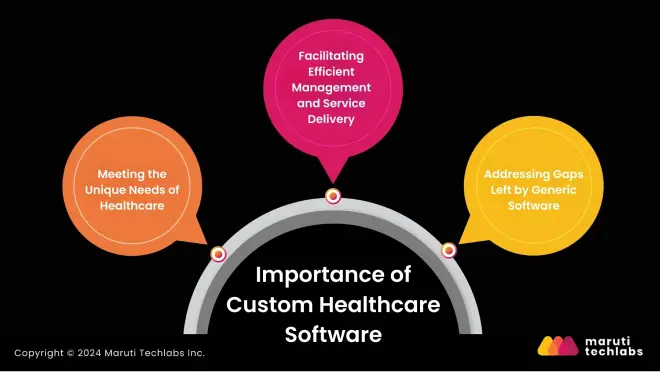
Custom healthcare software offers tailored solutions to these challenges, allowing hospitals, clinics, and other providers to address specific requirements, streamline operations, and deliver better patient care.
The following sections explore how custom solutions meet these needs and the various types of services they encompass.
Healthcare is a complex field with specialized needs that vary across different institutions, departments, and patient demographics. Custom healthcare software development services offer solutions tailored to hospitals, clinics, and healthcare professionals' distinct challenges. In contrast, a specialized clinic might require a niche solution for managing patient flow or tracking specific treatments.
Off-the-shelf software often fails to meet such diverse requirements. Custom solutions, however, allow healthcare organizations the flexibility to create software that mirrors their workflows, improves care coordination, and aligns with the institution's specific goals.
Beyond addressing unique challenges, custom healthcare software also significantly improves the efficiency of everyday operations.
Efficiency in healthcare management goes beyond just treating patients—it involves resource allocation, staff scheduling, financial operations, and compliance with healthcare standards. Custom healthcare software development allows for more efficient management of these processes by automating routine tasks, streamlining workflows, and ensuring that critical information is readily accessible.
This results in better decision-making, reduced administrative burdens, and a more seamless patient care experience.
Off-the-shelf solutions are developed for a broad audience and are typically rigid in their offerings. They often cannot provide the high level of customization healthcare providers require. Custom software development fills the blanks by offering personalized solutions that cater to the specific needs of individual organizations.
Whether incorporating telemedicine features, enhancing patient data analytics, or ensuring smooth integration with legacy systems, custom software ensures no stone is left unturned.
Now, let’s explore the different types of healthcare software development services and how each contributes to modern healthcare services.
Different types of custom software solutions cater to the different needs of healthcare providers and patients. From managing patient records to enabling remote consultations, these applications have streamlined operations, improved patient outcomes, and enhanced care delivery.
Here’s an overview of some of the most common types of healthcare apps and their primary functionalities.
Type of App | Description |
|---|---|
Electronic Health Records (EHR) Software | Digitizing patient records ensures secure and efficient data sharing among healthcare providers while complying with privacy standards like HIPAA. |
Telemedicine Software | Facilitates remote consultations through web or mobile apps, using text, audio, or video, enhancing accessibility to medical care. |
e-Prescribing Software | Allows doctors to create, track, and manage prescriptions digitally, improving medication safety and pharmacy communication. |
Medical Diagnosis Software | Offers patient symptom checkers and AI-driven analysis tools for professionals, aiding in quicker and more accurate diagnoses. |
Remote Patient Monitoring Software | Monitors patient's health remotely, providing real-time alerts for abnormalities, ideal for chronic condition management and post-surgery recovery. |
Healthcare Billing Software | Automates billing and payment processes, reducing administrative tasks and minimizing errors, leading to faster and more accurate transactions. |
Hospital Management Software | Streamlines administrative tasks like patient registration and equipment management, improving overall hospital efficiency and reducing downtime. |
To truly understand why custom solutions are the preferred choice, examining their key features is essential.
Custom healthcare software comes with essential features designed to meet the unique demands of the medical field. It ensures secure data storage, seamless integration with other systems, user-friendly interfaces, and compliance with regulations like HIPAA.
Additionally, its scalable design supports future growth, adapting to the evolving needs of healthcare organizations. Here’s a closer look at these key features.
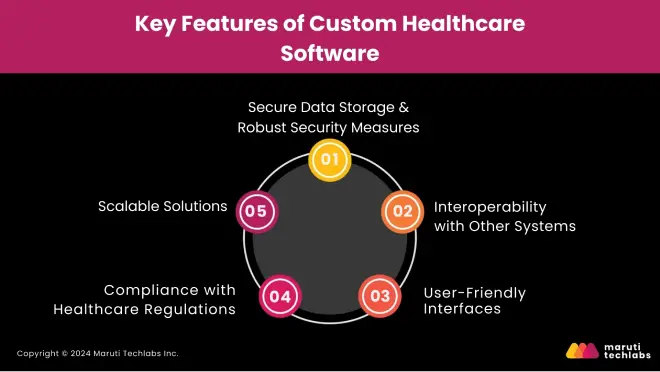
With the increasing volume of digital patient data, security and privacy concerns have become paramount. Custom healthcare software ensures that data is stored securely, with robust encryption techniques and multi-factor authentication. Compliance with healthcare regulations such as HIPAA (Health Insurance Portability and Accountability Act) and GDPR (General Data Protection Regulation) is integral in ensuring that patient data is safeguarded from unauthorized access.
Interoperability is a major challenge in healthcare, especially when institutions rely on multiple software solutions that don’t communicate with each other. The custom software fills this gap, ensuring smooth integration with other healthcare systems such as LIMS laboratory information management systems, radiology systems, and EHR platforms. This allows healthcare professionals easy access to information and data sharing for comprehensive patient care.
One of the main obstacles to adopting new healthcare technologies is complexity. Custom healthcare software makes complex concepts easier to understand with intuitive interfaces that require minimal user training. Whether it’s for physicians, nurses, or administrative staff, the software is built to accommodate the specific needs and workflows of the end-user, ensuring smooth adoption and usage.
Healthcare is a highly regulated industry; violating the regulations would mean significant legal and financial losses. The compliance requirements for custom-built software in healthcare should be met. This may involve standards including HIPAA, HITECH, and even GDPR. Solutions could also consider unique regulatory landscapes within various regions and specializations.
As healthcare organizations grow, so do their technological needs. Scalable custom healthcare software development services accommodate future growth and technological advancement without requiring an overhaul. This promotes the software to stay relevant and beneficial within the organization's growth by including new departments and services or integrating with emerging technologies.
Integrating advanced technologies enhances its capabilities and impact as healthcare software evolves.
Advanced technologies like AI, machine learning, and predictive analytics are transforming the capabilities of custom healthcare software. These tools enable smarter decision-making, improved patient care, and enhanced operational efficiency. With a strong technical foundation, custom solutions can adapt to the evolving needs of the healthcare industry, making them a vital part of modern medical services.
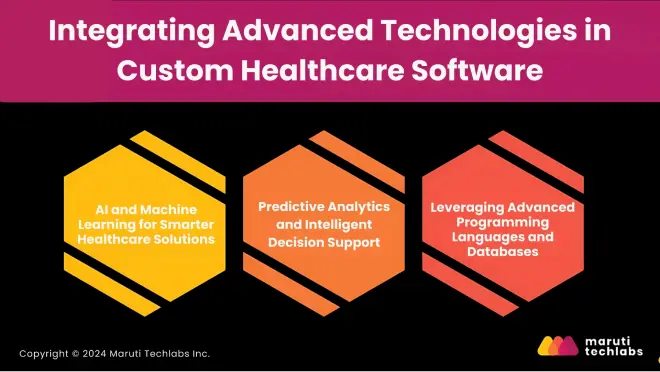
The following sections explore how these technologies shape modern healthcare software.
Artificial intelligence and machine learning help revolutionize healthcare by enabling predictive analytics, automating routine tasks, and providing intelligent decision support. Custom healthcare software often incorporates these advanced technologies to improve diagnostic accuracy, predict patient outcomes, and optimize resource allocation.
For example, AI algorithms can analyze large datasets to detect patterns in patient health, allowing for early intervention in chronic diseases. Machine learning models may also be applied to predict patient admission rates and, thus, achieve efficient bed-occupancy management in hospitals.
Predictive analytics play a significant role in giving a prior idea of patient needs and the smooth running of a hospital. Custom software integrates predictive tools that allow healthcare providers to analyze historical data and make informed decisions regarding treatment options, staffing, and resource management. This data-driven approach leads to more personalized patient care and better outcomes.
Behind every custom software solution is a robust technological infrastructure. Custom healthcare software is built using advanced programming languages such as Java and Python and databases like SQL and NoSQL to ensure the system is robust and flexible. This technical foundation supports complex operations, large datasets, and real-time processing required by healthcare systems.
Technology | Use Case in Healthcare |
AI & ML | Predictive analytics, decision support |
Python | Data processing, algorithm development |
Java | Scalability, EHR system development |
SQL/NoSQL | Large-scale data management |
While advanced technologies are reshaping the landscape, the tangible benefits of custom healthcare software cannot be overlooked.
Custom healthcare software delivers measurable business and clinical value by streamlining operations, improving patient outcomes, enabling remote care, and giving healthcare providers a competitive edge in a rapidly evolving digital landscape.
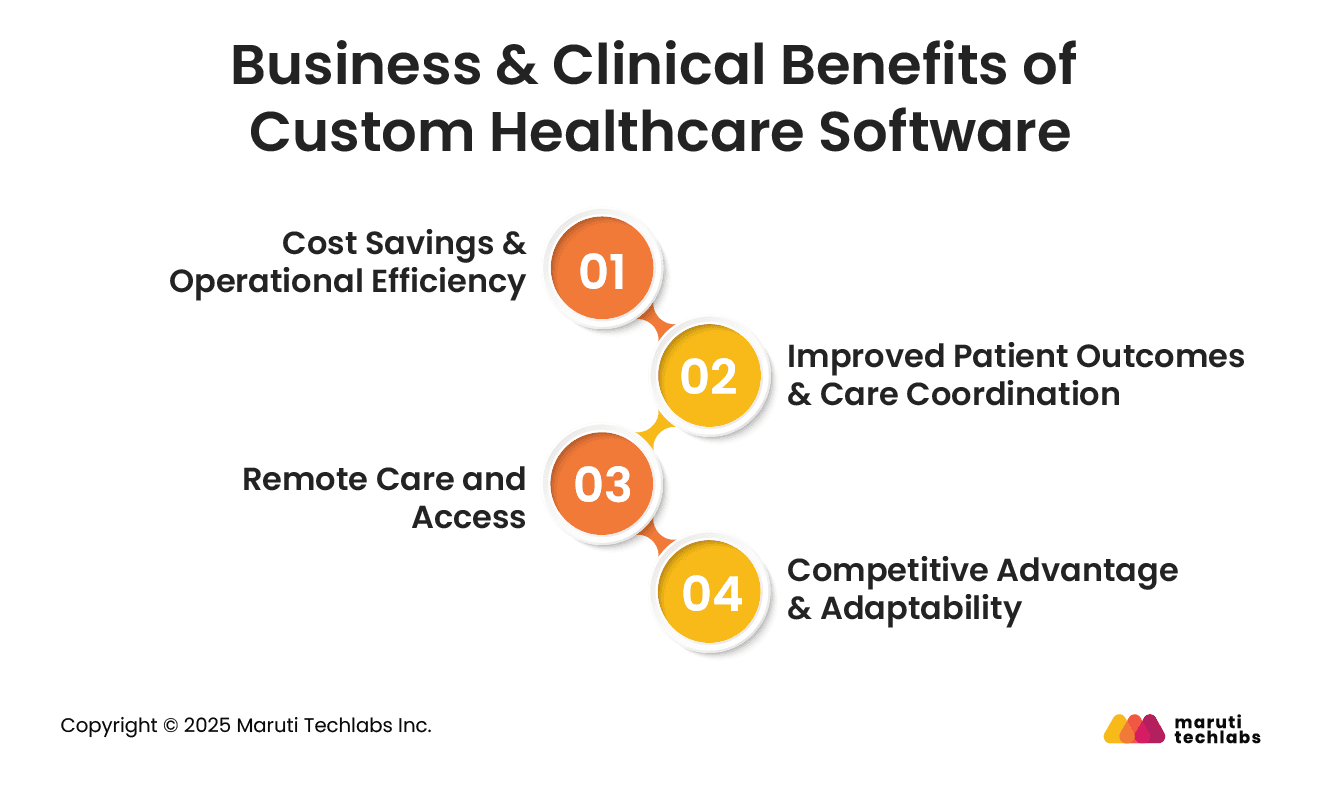
Tailored software automates repetitive tasks, reduces paperwork, and integrates billing, scheduling, and patient data management into one system. For instance, a hospital using a custom EHR reduced administrative time by 30%, freeing staff to focus on patient care and minimizing operational expenses over time.
Custom systems enhance data sharing across departments, ensuring clinicians have access to real-time patient information. A network clinic improved chronic disease management by 25% through personalized dashboards and automated alerts, enabling faster interventions and reducing errors caused by fragmented communication among specialists and caregivers.
With custom telehealth and remote monitoring tools, providers can extend care beyond hospitals. A rural health system increased patient follow-ups by 40% after adopting a custom telemedicine platform, improving accessibility, continuity of care, and patient satisfaction across underserved regions.
Custom healthcare solutions evolve with organizational goals—adding AI analytics, new modules, or integration features as needs shift. A growing health startup gained market share by launching a tailored patient app in six months, adapting quickly to trends and outperforming competitors relying on rigid off-the-shelf software.
The healthcare industry has been mounting pressure to improve care delivery by controlling rising costs, maintaining productivity, and complying with regulatory requirements. Custom healthcare software solutions provide healthcare organizations with the flexibility and functionality required to meet these challenges.
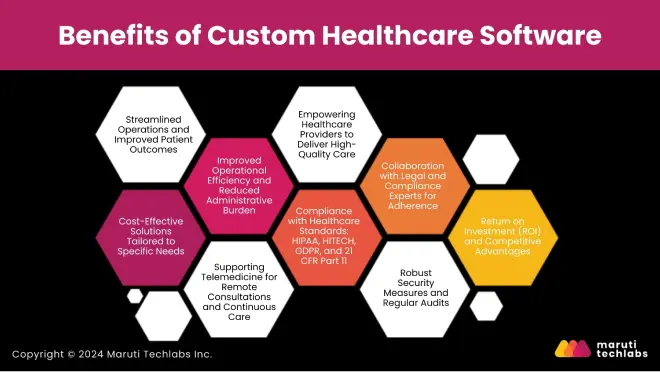
Below is an in-depth exploration of the benefits custom healthcare software offers.
The healthcare software development services come with several advantages. They provide efficient, cost-effective solutions with features specific to the needs of healthcare organizations. Although the actual investment in custom software is more than the off-the-shelf solution, it removes all unnecessary features. Instead, it focuses on what the institution needs.
This also leads to a reduction in long-term operational costs by streamlining processes and improving the management of resources.
By addressing the organization's needs, custom software helps avoid the additional costs associated with purchasing, maintaining, and integrating multiple third-party tools. Additionally, this tailored approach reduces the need for constant upgrades or modifications, further saving costs in the long run.
Administrative tasks in healthcare—such as appointment scheduling, billing, and patient data management—can be time-consuming and error-prone when handled manually or with generic software. Custom healthcare software development services automate these tasks, ensuring that repetitive administrative processes are completed accurately and quickly.
For instance, the automation of patient records, appointment reminders, and billing cycles allows healthcare providers to concentrate more on patients rather than administrative work. With the lowest possible manual entry and administrative bottlenecks, the healthcare sector becomes more efficient as a whole; fewer errors are detected, and ample time is saved on both patients' and staff's behalf.
A significant benefit of custom healthcare software development services is its ability to empower providers with the tools they need to deliver efficient, high-quality care. The software is designed to enhance clinical workflows, allowing healthcare professionals to access patient data, manage treatments, and coordinate care more easily.
Custom healthcare software development services can integrate electronic health records (EHR) and clinical decision support systems, giving providers quick access to comprehensive patient histories and predictive analytics. This ultimately improves diagnostic accuracy, treatment effectiveness, and patient outcomes.
Healthcare organizations benefit from streamlined operations through custom software that integrates different aspects of patient care into a single system. Whether combining EHR systems with lab management, billing, or telemedicine solutions, custom healthcare software improves workflow efficiency across the board.
With all systems working together seamlessly, healthcare providers can deliver faster, more coordinated care, improving patient outcomes. Accessing patient data in real-time also enables better monitoring of patient progress and more informed clinical decisions, ultimately enhancing the quality of care provided.
As telemedicine becomes integral to modern healthcare, custom software solutions are critical in facilitating remote consultations, remote monitoring, and continuous care. Custom software can integrate telemedicine features that allow healthcare providers to consult with patients via video conferencing, chat platforms, or digital health monitoring systems.
Healthcare organizations can expand access to care by offering remote care capabilities, especially in rural or underserved areas. Custom software supports continuous patient monitoring, enabling physicians to track chronic conditions, manage post-surgery recovery, and offer timely interventions from anywhere, thus improving patient outcomes.
Healthcare is a highly regulated industry, and custom healthcare software ensures that organizations adhere to industry-specific regulations such as HIPAA (Health Insurance Portability and Accountability Act), HITECH (Health Information Technology for Economic and Clinical Health Act), GDPR (General Data Protection Regulation), and 21 CFR Part 11, which governs electronic records and signatures.
Custom healthcare software development services are built with these compliance standards to ensure patient data is handled securely and confidentially. By complying with such regulations, healthcare organizations avoid costly fines, legal penalties, and reputational damage, ensuring that they operate within legal boundaries while maintaining high patient privacy and data protection standards.
Patient data security is a top concern in healthcare, and custom software solutions offer advanced security features to protect sensitive information. These include encryption, multi-factor authentication, role-based access controls, and regular security audits to detect and mitigate vulnerabilities.
Custom software development services allow healthcare organizations to tailor security protocols to their specific needs, ensuring that patient data remains protected from breaches, unauthorized access, or loss. Furthermore, regular audits and updates ensure the software complies with evolving security standards and regulations.
Complying with local, national, and international laws is critical in the complex healthcare landscape. Custom healthcare software is often developed in collaboration with legal and compliance experts who ensure that it adheres to all regulatory standards.
This collaboration is vital as healthcare regulations are constantly evolving. Having a custom solution that adapts to new laws and regulations keeps healthcare organizations compliant and safe from legal challenges. The continuous involvement of compliance experts ensures that the software evolves alongside legislative changes, preventing potential legal issues.
Finally, custom healthcare software development services offer a compelling return on investment (ROI) by improving efficiency in operations, reducing manual errors, and streamlining patient care. While the initial development cost may be higher than purchasing off-the-shelf software, the long-term benefits outweigh the costs.
Moreover, custom software gives healthcare organizations a competitive edge by offering features tailored to their needs, improving patient satisfaction, and enhancing operational performance. This ultimately leads to increased profitability, improved patient retention, and a stronger reputation in the healthcare industry.
Achieving healthcare benefits requires a thoughtful approach to collaboration between healthcare providers and software development teams. Here are a few points to consider.
The journey to custom healthcare software development services begins by collaborating with experienced development teams that understand the complexities of the healthcare industry. This process involves defining the organization's specific needs, setting project goals, and developing a customized solution that aligns with the institution’s vision.
Effective custom software development is a collaborative process. By maintaining open communication with the development team, healthcare providers can ensure that the software evolves with their needs. This includes regular updates, feature enhancements, and addressing emerging regulatory requirements.
Let’s explore some key challenges while developing custom healthcare software.
Developing custom healthcare software comes with its challenges. From ensuring compliance with strict regulations to integrating advanced technologies, developers must navigate a range of complexities to create solutions that meet the needs of healthcare providers and patients alike.
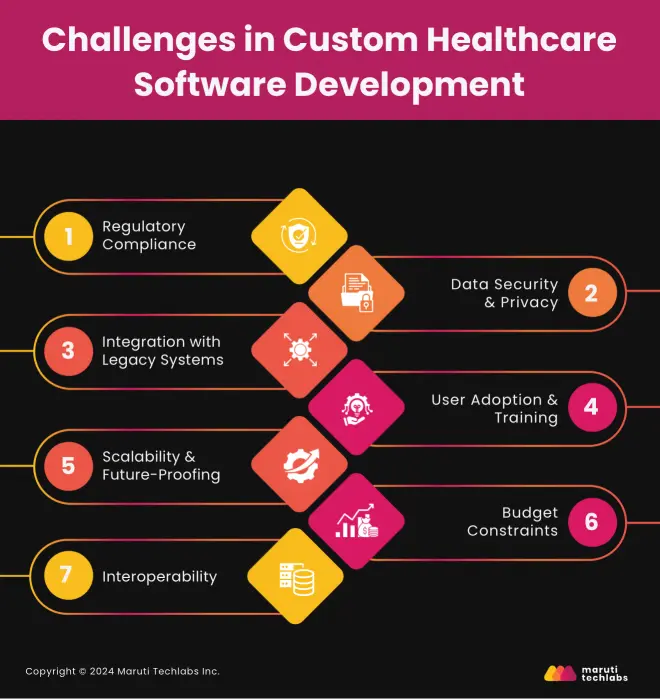
Addressing these challenges is crucial to delivering effective and reliable software in a highly regulated industry.
Adhering to healthcare regulations like HIPAA, HITECH, GDPR, and local laws is critical. Developers must ensure that software meets these standards, which can be complex and time-consuming, especially with varying regulations across regions.
Healthcare software deals with sensitive patient information, making robust data security measures essential. Ensuring data encryption, secure access protocols, and protection against breaches is a constant challenge.
Many healthcare providers rely on older systems for their operations. Integrating new software with these legacy systems can be difficult due to compatibility issues, creating potential disruptions during implementation.
New software solutions often require significant changes in workflows, which can lead to resistance from staff. Ensuring user-friendly interfaces and providing adequate training are crucial for successful adoption.
As healthcare needs evolve, software must be adaptable to handle increased data volumes and new functionalities. Developers face the challenge of building scalable systems that can integrate emerging technologies.
Custom healthcare software development can be expensive, especially when accounting for advanced features, compliance, and ongoing support. Balancing costs while delivering high-quality solutions is a key challenge for development teams.
It is essential to ensure that new software can communicate effectively with existing healthcare systems (EHRs, lab systems, etc.). Achieving seamless interoperability is complex but crucial for coordinated patient care.
As the healthcare industry is rapidly evolving, new technologies emerge. Here are the trends shaping the future of custom healthcare software development, from IoT, and AI, to personalized care systems.
The Internet of Things (IoT) is reshaping healthcare delivery by enabling connected devices that monitor patient health in real-time. Custom software development will increasingly integrate IoT devices to provide real-time patient data, ensuring proactive care and improved patient outcomes.
The integration of AI in healthcare will continue to grow, offering advanced diagnostic tools, personalized treatment plans, and intelligent healthcare operations. Custom healthcare software incorporating AI will provide even greater decision support, improve patient care, and increase the efficiency of healthcare delivery.
Outsourcing custom healthcare software development has become a popular strategy for healthcare organizations looking to build advanced solutions without the burden of managing an in-house development team. This approach enables them to focus on their core mission—providing high-quality patient care—while leveraging the skills and resources of experienced software developers.
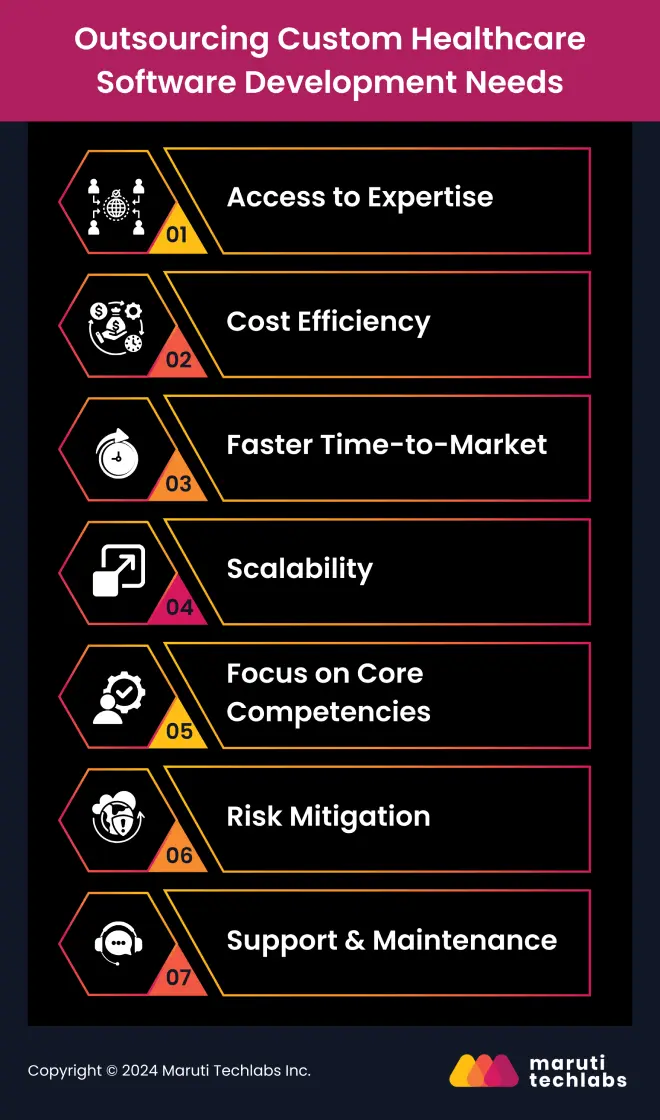
Here are some key benefits of outsourcing custom healthcare software development needs.
Outsourcing offers access to the expertise of experienced software development teams. These teams have professional knowledge about healthcare technologies, regulatory compliance, and best practices to ensure a high-quality end product.
By outsourcing development, healthcare providers can reduce costs associated with hiring and maintaining an in-house team. This includes savings on salaries, training, infrastructure, and development tools, allowing for a more budget-friendly solution.
External development teams often have the resources and experience to work on tight timelines, allowing healthcare organizations to launch their software solutions more quickly. This speed is precious in rapidly evolving healthcare environments where timely access to new technologies can improve patient outcomes.
Outsourcing partners can easily adjust the size and composition of their development team to match a project's evolving needs. This scalability ensures that healthcare organizations can meet short-term and long-term software needs without major disruptions.
By outsourcing development, healthcare providers can focus on their primary responsibilities—delivering quality patient care—without being distracted by the complexities of software development. This allows organizations to enhance their services while leaving technical challenges to the experts.
Established outsourcing partners often bring processes for risk management, quality assurance, and adherence to deadlines. They also stay updated on industry trends and regulatory changes, which can help mitigate risks associated with software development in the healthcare sector.
Outsourcing companies typically offer ongoing support and maintenance, ensuring the software remains up-to-date and functions smoothly after deployment. This is particularly valuable for addressing bugs, updates, and new regulatory requirements.
Custom healthcare software development services are no longer an option; they’re necessary for healthcare organizations looking to stay competitive and provide top-tier patient care. Custom software addresses the providers' specific needs while affording the necessary regulatory compliance, integrating new and innovative technologies to shape the future of healthcare.
Ready to transform your healthcare delivery? At Maruti Techlabs, a custom software development company in New York, we specialize in custom healthcare software development services tailored to your needs. Our experienced team will work closely with you to create solutions that enhance patient care, improve operational efficiency, and ensure compliance with industry regulations.
Contact us today to start your journey toward innovative healthcare solutions that make a difference!
When evaluating custom healthcare software, essential features include secure patient data storage, interoperability with existing systems, user-friendly interfaces, robust reporting and analytics capabilities, and compliance with healthcare regulations. Features like telemedicine support, appointment scheduling, and electronic health record (EHR) integration can enhance functionality.
The cost of developing custom healthcare software varies depending on several factors, including the project's complexity, the technology stack used, and the development team's location and expertise. While initial costs may be higher than off-the-shelf solutions, custom software can provide long-term savings by reducing inefficiencies and improving patient care.
Yes, one key advantage of custom healthcare software is its ability to integrate seamlessly with existing systems, such as EHRs, laboratory information management systems (LIMS), and billing software. This interoperability ensures data flows smoothly across platforms, enhancing care coordination and operational efficiency.
Common challenges in custom healthcare software development include scope creep, which occurs when project requirements change over time and ensuring compliance with regulatory standards. Additionally, managing user expectations and achieving seamless integration with existing systems can pose challenges. Effective communication and thorough planning can help mitigate these issues.
User experience (UX) is crucial in custom healthcare software development, as it directly impacts how easily healthcare providers and patients can interact with the software. A user-friendly interface can enhance efficiency, reduce training time, and improve overall satisfaction. Prioritizing UX design ensures that the software aligns with the users’ needs and workflows, leading to better adoption and outcomes.


